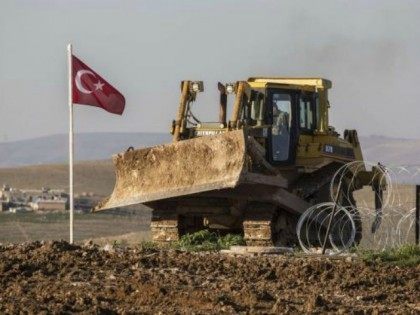World View: Patriotism and Nationalism Surge in Saudi Arabia, but Not in Iran
Saudi Arabia declares that it’s met its military objectives in Yemen; Patriotism and nationalism surge in Saudi Arabia, but not in Iran

Saudi Arabia declares that it’s met its military objectives in Yemen; Patriotism and nationalism surge in Saudi Arabia, but not in Iran

(Reuters) – The U.S. State Department said on Monday it might talk with Iran about promoting regional stability, noting it had been open to including Iran in past efforts to achieve a Syrian peace deal if Tehran had altered its policy.
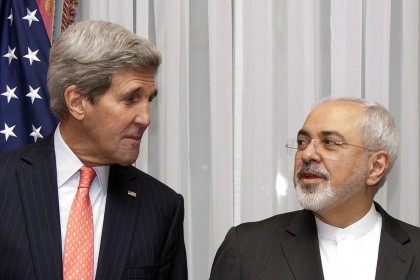
Thousands of immigrants flee xenophobic attacks in South Africa; South African xenophobic violence echoes 1820s Mfecane Zulu massacre

Russia’s Chechnya becomes biggest contributor of jihadists to ISIS; Chechen youth from Georgia’s Pansiki Gorge joining ISIS in droves
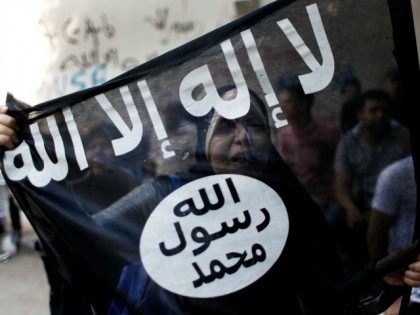
Members of the UN Security Council watched videos of doctors who could not save children after a chlorine gas attack in Syria. The footage was so disturbing, members of the council reportedly broke down in tears.

Thousands of immigrants flee xenophobic attacks in South Africa; South African xenophobic violence echoes 1820s Mfecane Zulu massacre

Gaza prepares for all-out war with Israel; Iran and Qatar give Hamas money and weapons to fight Israel; Israel prepares for war with Hamas in Gaza; Greece denies reports that it’s preparing for a default

At least 45 female jihadists appeared in a training video at Saint Simeon Stylites, which is the world’s oldest Byzantine church, near Aleppo, Syria. The women are demanding equality with men on the battlefield.
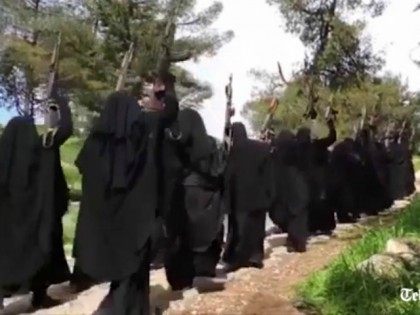
Syria’s Yarmouk refugee camp descends into the ‘deepest circle of Hell’; Palestinians flip-flop on Syrian action in Yarmouk refugee camp; Europe demands list of reforms from Greece after numerous delays; Iran’s demands on sanctions threaten to unravel nuclear deal
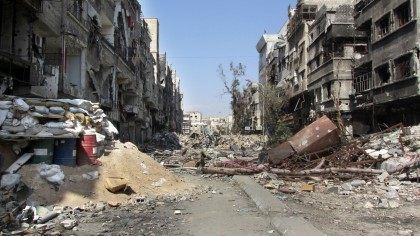
Imam Abdul Hadi Arwani, described by the UK Daily Mail as “a Syrian preacher at a fundamentalist mosque,” was gunned down on the streets of London on Tuesday, possibly because he was an outspoken critic of Syrian dictator Bashar Assad.

Bashar al-Assad’s Syria army showing signs of collapse; Why do Awakening era civil wars always fizzle?; US speeds up weapons deliveries to militias in Yemen

There is a major Palestinian refugee camp on the road to Damascus, which the Islamic State is still marching down, despite efforts to “degrade and ultimately destroy” their war machine by Bashar Assad’s de facto allies in the U.S. coalition.
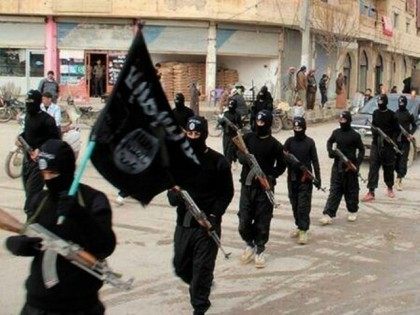
ISIS pushes closer to Damascus through Syria’s Yarmouk refugee camp; Texts of Iran nuclear deal differ in English and Farsi versions; Kenya’s president: terrorists are ‘deeply embedded’ in Kenya
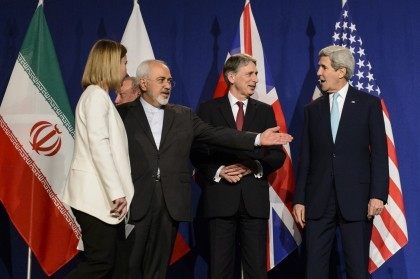
China to sell eight advanced submarines to Pakistan, encircling India; As Russia-Saudi relations deteriorate, Egypt tries a middle road; Greece turns to Russia and China, amid reports of imminent default

Members of a Palestinian faction linked to the terror group Hamas, backed by Syrian rebels, were able to retake large parts of a refugee camp in Syria that had been seized by Islamic State (ISIS/ISIL) jihadists, according to a monitoring group.

ISIS captures Yarmouk refugee camp, closes in on Damascus; Hezbollah trapped by a sense of collapse in al-Assad’s army; Turkmenistan fears jihadist invasion from Afghanistan; Palestinian Authority joins International Criminal Court
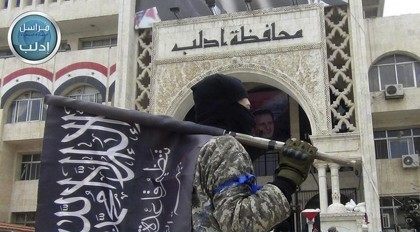
Russian President Vladimir Putin received massive blacklash from countries at the Arab summit when he submitted a letter that stated he could not “express support for the Middle East.” The leaders at the summit accused Putin of hypocrisy since he is a known ally of Syrian President Bashar al-Assad.

Syrian dictator Bashar al-Assad indicated that, contrary to assessments by U.S. officials, the Islamic State (ISIS/ISIL) in Iraq and Syria is actually getting stronger, recruiting an estimated 1,000 militants each month in those two countries alone.

Syria’s al-Assad regime suffers major military setback in Idlib; Arab League positions harden against Houthis and Iran

According to the Associated Press, Syrian dictator Bashar al-Assad is open to discussing cooperating with the United States—years after President Obama’s chemical weapons “red line” debacle—but demands respect as a legitimate ruler despite cementing power in an election the State Department openly called a “sham.”

Iraqi Foreign Minister Ibrahim al-Jaafari visited Syrian President Bashar al-Assad on Tuesday in an event that appears intended to strengthen ties between Baghdad and Damascus in light of their mutually shared threat of Islamic State (ISIS) invasion. Iraq’s desire to forge stronger ties with Assad flies in the face of American diplomatic efforts to isolate the dictator after his alleged use of chemical weapons on civilians.

Al-Monitor delivers one of the most sobering assessments of the bloody mess in Syria to date, as author Edward Dark returns to his hometown of Aleppo for a look at the plight of the dwindling Christian community, and finds them turning to dictator Bashar al-Assad for protection from the jihadis fighting to overthrow him.

Almost all mosques have been destroyed in Central African Republic; Russia finally begins to grasp the danger posed by ISIS

The Associated Press reports that Jordan has announced plans to help train Syrian rebels to fight the Islamic State. “The training is part of a regional effort also involving Turkey, Saudi Arabia and Qatar as hosts of training sites. The U.S. Congress has passed legislation providing $500 million for training about 5,000 rebels over the next year,” writes the AP.

The Associated Press reports that a Syrian military helicopter has crashed following an equipment malfunction, resulting in the capture and killing of its crew by “insurgents” of the al-Nusra Front.
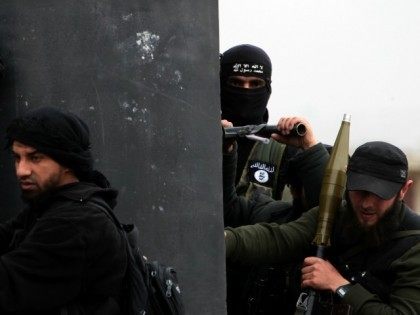
Greece’s Alexis Tsipras threatens Europe with ‘jihadists and terrorists’; Eurogroup chairman suggests capital controls in Greece; Houthi airstrikes bomb Aden as Yemen war widens; Kerry: US is ‘deeply disturbed’ by Syrian regime’s chemical weapons

Bashar al-Assad’s military likely shot down a U.S. Predator drone in northwest Syria, U.S. officials told various news outlets.

The fallout over Secretary of State John Kerry’s implication that the United States is open to potentially negotiating with Syrian dictator Bashar al-Assad continues, as Germany’s foreign minister now weighs in, suggesting that such negotiations may be necessary to minimize the loss of life in the ongoing Syrian Civil War and weaken the Islamic State (ISIS) terrorist group.

WASHINGTON, DC — The State Department is now saying that Syrian dictator Bashar al-Assad will “never” be part of peace negotiations, but members of his regime could play a role in ending the bloodshed and suffering in the war-torn nation.

Sunday, after meeting with Iranian officials in Damascus on state television, Syrian President Bashar al-Assad, addressed Secretary of State John Kerry’s “offer” to negotiate the end of their civil war, saying such statements “from outside do not concern us.” Secretary

Lebanese terror group Hezbollah, at the behest of Iran, is expected to send around 800 of its elite militants to fight alongside Iraqi forces and Shiite militias to retake Mosul from the Islamic State (ISIS/ISIL), reports the London-based al-Araby al-Jadeed newspaper.

Secretary of State John Kerry told CBS News that the United States is now willing to negotiate with (and accept as a legitimate ruler) Syrian dictator Bashar al-Assad, a striking contrast from the administration’s prior insistence that regime change would be the only tolerated approach for Damascus.

With its support of the Baghdad government and the wrong rebels in Syria, the US Administration is doing the unthinkable: strengthening the spread of Tehran’s control in the Middle East and at the same time also helping the Sunni extremists to grow in power.
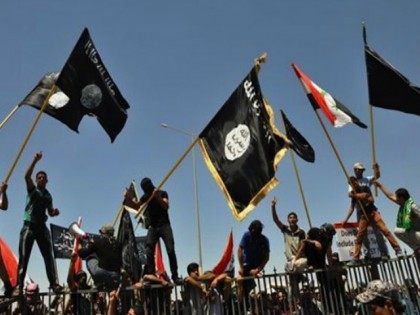
Turkey, Saudi Arabia and Pakistan seek ‘Sunni unity’ versus Iran; Turkey’s Erdogan shuts out Al-Sisi and Egypt from discussions; After a year, experts still guessing about Malaysia Airlines 370

(Reuters) – Al Qaeda’s Syrian branch was left reeling on Friday after its military chief was killed in an apparent army air strike, adding to confusion over the future path of the most powerful group opposing both President Bashar al-Assad and Islamic State.

Washington (AFP) – The US military’s top officer, General Martin Dempsey, told lawmakers on Wednesday it was possible special operations forces could eventually be sent to Syria to back up American-trained rebels.

File this report from the Daily Star of Lebanon under the category of “Yay … I Guess,” or perhaps “Two and a Half Cheers.” It’s good news that Islamic State (ISIS) forces have been pushed out of over 20 Syrian villages. The bad news is that Bashar al-Assad’s regime did most of the pushing, with an assist from Kurdish militia units.

The long and lonely search for a white hat posse of “moderate” Syrian rebels that could be armed by the United States and turned into a weapon against both the Assad regime and its most effective military adversaries—namely, ISIS and al-Qaeda—suffered another grievous setback over the weekend, as the first Syrian rebel force, armed with American weapons, threw in the towel and pronounced itself kaput.

Reports indicate Egypt, Italy, Russia planning military action in Libya; Egypt court declares Hamas to be a terrorist organization; Egypt and Turkey may try to create a ‘Sunni front’ with Saudi Arabia

Senior Syrian government officials and diplomats are accusing the Turkish government of cooperating with the Islamic State in the evacuation of the medieval tomb of Suleyman Shah, Turkey’s only sovereign territory not connected to its mainland. The evacuation, said one minister, was an “act of war” against Syria.
